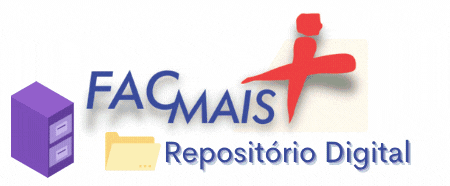Use este identificador para citar ou linkar para este item:
http://65.108.49.104:80/xmlui/handle/123456789/536| Tipo: | Dissertação |
| Título: | TECNOLOGIAS DIGITAIS E ENSINO HÍBRIDO |
| Autor(es): | DANTAS, Elisanne de Souza |
| Primeiro Orientador: | VASCONCELOS, Maria Luiza Gomes |
| Resumo: | Desenvolvida dentro da Linha de Educação, Instituições Políticas Educacionais, do Programa de Pós-Graduação em Educação (Stricto Sensu) da Faculdade de Inhumas — FacMais, esta dissertação apresentou uma análise acerca do ensino híbrido e das tecnologias digitais no âmbito da escola pública. O objetivo geral foi o de compreender o conceito de ensino híbrido e como sua aplicação pode auxiliar na diminuição dos problemas na educação, mediante a integração entre o mundo físico e o mundo virtual. Os objetivos específicos foram: conhecer os elementos dentro do sistema educacional que dificultam a aprendizagem; definir ensino híbrido e apontar possíveis mudanças provocadas por esse ensino na escola; e estudar as formas como o ensino híbrido pode ser aplicado de modo positivo. Para atingir os objetivos elencados, procedeu-se a uma pesquisa de natureza qualitativa. Assim, foi feito um estudo bibliográfico, utilizando teorias e experiências dos autores como ponto de partida para uma análise do impacto das tecnologias na educação, além do estudo de documentos que regem as políticas educacionais. Com base em observações feitas pela pesquisadora, surgiram as seguintes indagações: como a estrutura pedagógica escolar formou-se e como seus elementos se relacionam? Como aliar o ensino presencial aos recursos empregados no ensino a distância? O que é o ensino híbrido e como este pode ser aplicado para auxiliar na resolução de problemas relacionados ao processo ensino-aprendizagem? Partindo dessas questões, buscou-se um aporte teórico que investigasse o objeto de estudo, de modo a fazer uma análise e reflexão e encontrar possíveis respostas aos questionamentos levantados. A pesquisa que deu origem a esta dissertação amparou-se em diversos teóricos, destacando-se: Libâneo (2012), Bacich, Neto, Trevisani (2015), Lima e Moura (2015), Machado (2020), Moran (2015), Rodrigues (2015), Valente (2015), dentre outros. As dificuldades no processo ensino-aprendizagem justificam o estudo acerca do tema, pois há a necessidade de a escola ter significado e promover sentido à vida social dos alunos. Ficou evidente a urgência de pôr o estudante no centro da aprendizagem, de modo a perceber as relações existentes entre o que se vê na escola e a realidade que o cerca. As alterações enfrentadas pela escola, devido às transformações do meio social em que se encontra inserida, exigem daqueles que fazem parte do processo conhecimentos e competências para adequá-la à realidade. |
| Abstract: | Developed within the Education, Institutions and Educational Policies line of the Postgraduate Program in Education (Stricto Sensu) of the Faculdade de Inhumas - FacMais, this dissertation presented an analysis about hybrid teaching and digital technologies in public schools. The general objective was to understand the concept of hybrid teaching and how its application can help reduce problems in education, through the integration between the physical and virtual worlds. The specific objectives were: to know the elements within the educational system that hinder learning; to define hybrid teaching and point out possible changes caused by this teaching in school; and to study the ways in which hybrid teaching can be applied in a positive way. To achieve these goals, we carried out a qualitative research. Thus, a bibliographic study was done, using the authors' theories and experiences as a starting point for an analysis of the impact of technologies in education, in addition to the study of documents that govern educational policies. Based on observations made by the researcher, the following questions arose: how was the school pedagogical structure formed and how are its elements related? How can face-to-face teaching be allied to the resources employed in distance learning? What is hybrid teaching and how can it be applied to help solve problems related to the teaching-learning process? Based on these questions, we sought a theoretical contribution that would investigate the object of study, in order to analyze and reflect and find possible answers to the questions raised. The research that gave rise to this dissertation was based on several theorists, namely: Libâneo (2012), Bacich, Neto, Trevisani (2015), Lima and Moura (2015), Machado (2020), Moran (2015), Rodrigues (2015), Valente (2015), among others. The difficulties in the teaching-learning process justify the study about the theme, since there is a need for the school to have meaning and promote meaning in the students' social lives. It became evident the urgency to put the student at the center of learning, in order to perceive the existing relationships between what is seen at school and the reality that surrounds him/her. The changes faced by the school, due to the transformations in the social environment in which it is inserted, require knowledge and skills from those who are part of the process to adapt it to reality. |
| Palavras-chave: | Educação Ensino Híbrido Tecnologia Digital |
| CNPq: | CNPQ::CIENCIAS HUMANAS::EDUCACAO |
| Idioma: | por |
| País: | Brasil |
| Editor: | Faculdade Facmais |
| Sigla da Instituição: | FACMAIS |
| metadata.dc.publisher.department: | Departamento 1 |
| metadata.dc.publisher.program: | PPG1 |
| Tipo de Acesso: | Acesso Aberto |
| URI: | http://65.108.49.104:80/xmlui/handle/123456789/536 |
| Data do documento: | 9-Ago-2022 |
| Aparece nas coleções: | Dissertações do Mestrado |
Arquivos associados a este item:
| Arquivo | Descrição | Tamanho | Formato | |
|---|---|---|---|---|
| ELISANNE DE SOUZA.pdf | 842.25 kB | Adobe PDF | Visualizar/Abrir |
Os itens no repositório estão protegidos por copyright, com todos os direitos reservados, salvo quando é indicado o contrário.
